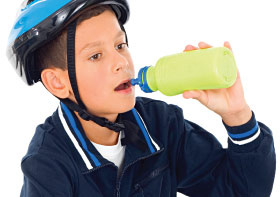When Children Grind Their Teeth
Is The Habit Of 'Bruxism' Harmful?
(Continued)
Bruxism, Stress And Heredity
Bruxism, either clenching while awake or grinding during sleep, is associated with stress and anxiety. The exact mechanism by which these and other psychological factors contribute is still unknown. Emotionally stressful states are often manifested physically by an increase in the release of adrenaline-like hormones, which initiate the “fight or flight” response. One study showed that people with bruxism have elevated levels of these hormones in their urine compared to those who don't grind their teeth. Interestingly parafunctional habits seem to run in families, so this activity may be genetic.
Another study looked at teeth grinding as it relates to aggression and somatization, the process by which psychological distress is expressed as physical symptoms. The report indicated that an increased amount of aggression manifests physically as bruxing in children as young as 5 and 6.
Bruxism is found in those who suffer from post-traumatic stress disorder, further suggesting that psychological factors may be involved. Counseling and other forms of relieving psychological stress, such as muscle relaxation, have been shown to reduce teeth grinding in children.
 |
| The rise of soft drink consumption in children has also contributed to the development of tooth wear by enamel erosion. |
Treatment And Prevention — Or Not
Because children generally outgrow the condition, treatment is not usually recommended — unless the habit is causing troubling signs and/or symptoms, as well as excessive tooth wear. But it can be difficult to determine if dental wear indicates a current tooth-grinding habit, as bruxism varies over time. Other symptoms associated with bruxism, such as headache, jaw pain or ear pain, can also be caused by things unrelated to teeth grinding. Another important consideration is whether the child's diet is a factor. The rise of soft drink consumption in children has also contributed to the development of tooth wear by enamel erosion. Sodas (either with high sugar content or the diet variety), sports drinks, and fruit juices are very acidic and bathe the teeth in tooth-eroding acid, especially if consumed throughout the day. Saliva, nature's way of neutralizing acids, needs at least 30 minutes to stop this process.
If a pediatric dentist or general dentist traces your child's dental problems to teeth grinding, he or she may recommend a thin, plastic nightguard to prevent parafunctional activity during sleep, though this remedy has not proven effective for baby teeth. Your pediatric or general dentist may also recommend that parents enlist the help of a specialist. Children with upper airway obstruction should be referred to a doctor known as an Ear, Nose And Throat (ENT) specialist. Kids with severe psychological problems should be referred for therapy. Parents of children or adolescents who are taking medications that may cause bruxism can discuss the condition with the child's primary care provider including whether it's possible to switch medications.
Until the origins of teeth grinding in children are more fully understood, treatment will continue to be based on anecdotal evidence. The important thing to remember is that the habit of teeth grinding is usually harmless, despite the unsettling sounds. Luckily, new teeth will be on the way.




